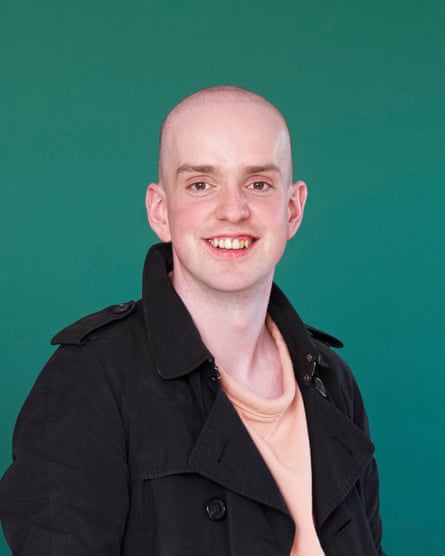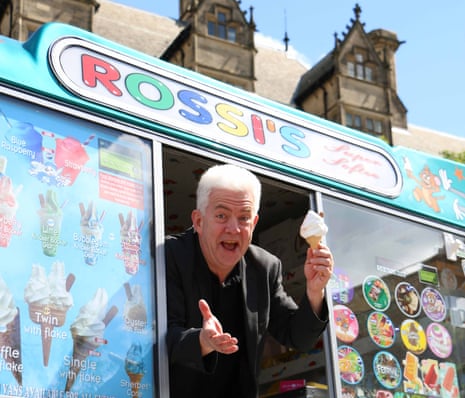Ian McMillan, nicknamed the bard of Barnsley, is a poet, writer, playwright and saviour of dialect, especially that of his native south Yorkshire. He is best known as presenter of The Verb on Radio 3. His first job, in the 1970s, was on a buff and dip machine, sticking together tennis balls. He has been poet in residence at Barnsley Football Club, Humberside Police and English National Opera. He has written the text for Ice Cream: The Opera, receiving its world premiere at Bradford festival on Sunday 30 July.
You’ve said this opera is so hot it’ll melt your heart. How so?
Because it’s the first opera ever set on two separate ice-cream vans. It’s about warring ice-cream families. It’s a kind of Romeo and Juliet or West Side Story. Without giving any spoilers, I’ll bet it all works out all right in the end. The composer is Russell Sarre, an Australian who lives in America. It was all done by email – I’d send him words at a sensible time in Barnsley and he’d get them at a not sensible time in the States. It’s a challenge not being in the same room, or even the same continent.
You wrote your first libretto when you were 10?
I probably didn’t know it was a libretto at the time. Just “the words”. The opera was called The Diamond-Studded Triceratops. We were staying in a guest house in Weston-super-Mare. The weather was terrible. So I sat in the hotel lounge with a group of elderly ladies from Taunton and they watched me write it. Then they indulged me terribly by making me perform it. I made up a melody – just one – and played all the parts. I don’t think there was a lot of action. I was such a terrible show-off.
But did you know any opera, or even what opera was?
Well, Dad sang all the time. He had a rather nice tenor voice. He liked songs like Donald Where’s Your Troosers, but he also crooned in a kind of operatic way about whatever he was doing. “I’m just about to do the washing-up” or whatever. I’d just been reading The Lost World by Arthur Conan Doyle and a lot of Biggles too – which are all very operatic.
You grew up in a south Yorkshire mining village. How did life as a poet start?
Childhood was an endless delight. I was lucky enough to benefit from a West Riding primary school education. Sir Alec Clegg, the famous and innovative chief education officer and one of my heroes, believed all children were creative. So school was all about song, dance, theatre. After a maths lesson we’d write a poem or sing. It all felt totally normal. In fact it was very progressive. And the mining community was full of music – brass bands, church choirs – all the time.
The pit head dominated the landscape but it was also quite rural?
I’d call it DH Lawrence-esque. The mining only started near the end of the 19th century. We were just two or three generations from people working the land. There was always a great connection with the seasons. And the people who worked below ground – down the pit – connected with that. They had allotments and believed in things like seasonal vegetables long before it became the fashion. You can rent a country cottage in my home village now. It’s advertised as “a gateway to the Dales” – which it is, but the path is very long.
You’ve had enormous success, yet you’ve stayed close to home and married your childhood sweetheart.
Yes, I met my wife – she was in the year above me at school – when I was 14. My three young grandkids are nearby. I can do my job from anywhere, but it’s more than that. If I moved away, I’d move from the wellspring of my inspiration. Here I’m just “that bloke”. I still work in the back room. I had the loft converted but it was too quiet up there. And then there was the ladder…
It’s so interesting to be part of a longstanding community. You see the universal in the local, in the few tight streets you live in. I feel an obligation, and apart from anything else I’d feel ridiculous anywhere else – Timbuktu or Bexleyheath – I’d be like Groundskeeper Willie in The Simpsons, or a town jester.

When the pits closed, 60,000 people in your area of south Yorkshire lost their jobs. Describe life there now.
Barnsley is culturally very interesting. Without any irony I’d say there’s really a cultural quarter now, with the Cooper Gallery and the Civic theatre. I’m on the museums board. It’s just had £2m from the lottery. So money is coming into Barnsley, but not yet enough permanent jobs. Most mining jobs have been replaced by work in warehouses and call centres. Some villages, like neighbouring Grimethorpe where my daughter lives, have done better with investment than others, and the brass band [inspiration for the film Brassed Off] is still going strong.
Your son, Andrew McMillan, also a poet, won the Guardian first book award in 2015 for his collection, Physical. He has said seeing how hard you worked was an inspiration…
Did he? Did he really? [laughter] He’s doing so well. I always took him and my two daughters to everything. The girls were more keen on dance. He loved youth theatre and debate. I dream that he’ll be so successful I’ll be able to retire and he can look after me. When he told us he was gay, I gave him the poems of Thom Gunn. I knew he was embarking on a journey. Now Andrew’s done a quote on the back of a new edition of Gunn’s Selected Poems. Proud? I’m proud to bits of all my children.
You’ve always been a populariser. Did you have to fight harder to win serious recognition?
It’s never felt like that. What I like doing best is presenting The Verb. I’m popularising the art form and no one seems to object. The old boundaries are fuzzier, less rigid. I never feel put down. But then I’ve got a very hard skin. Like a cockroach. But more friendly.

Comments (…)
Sign in or create your Guardian account to join the discussion